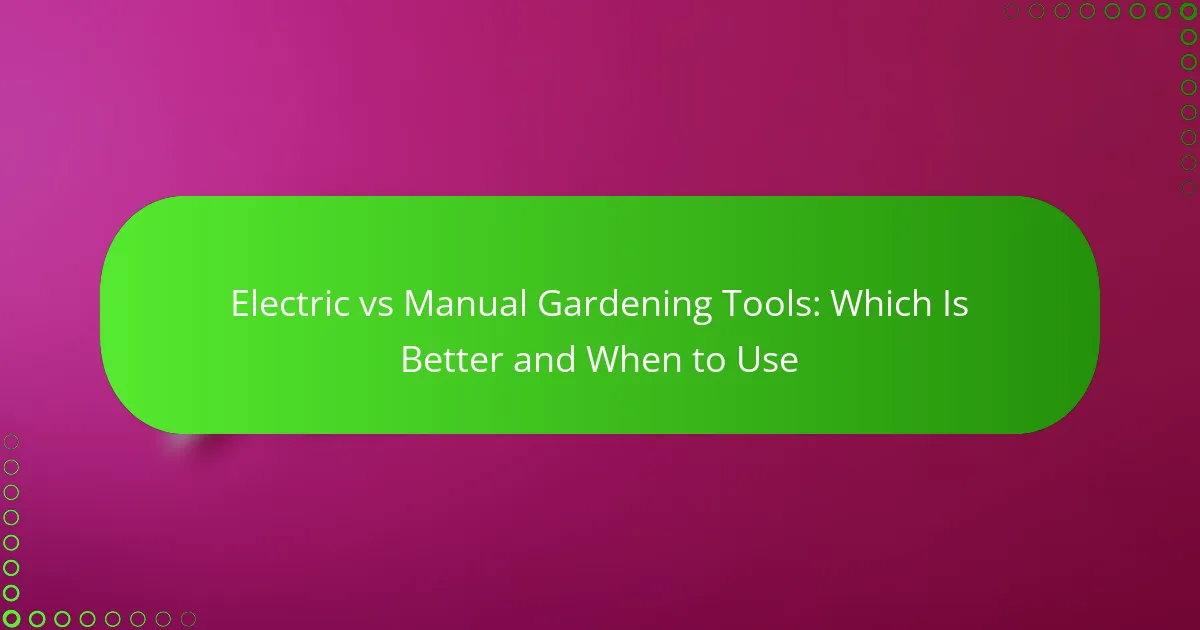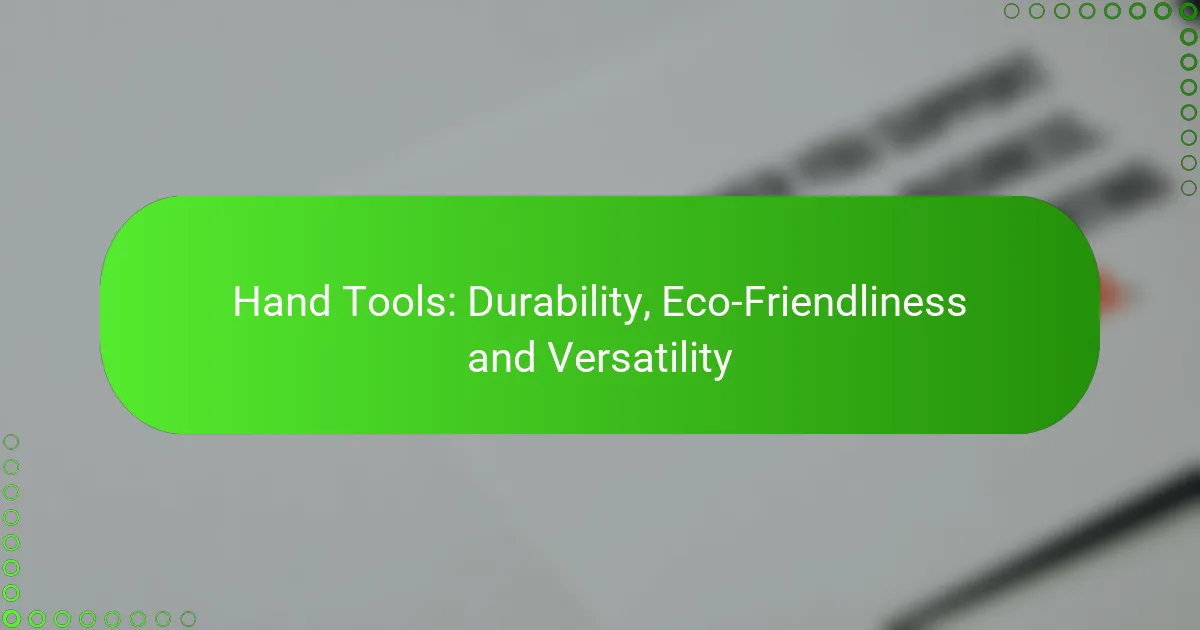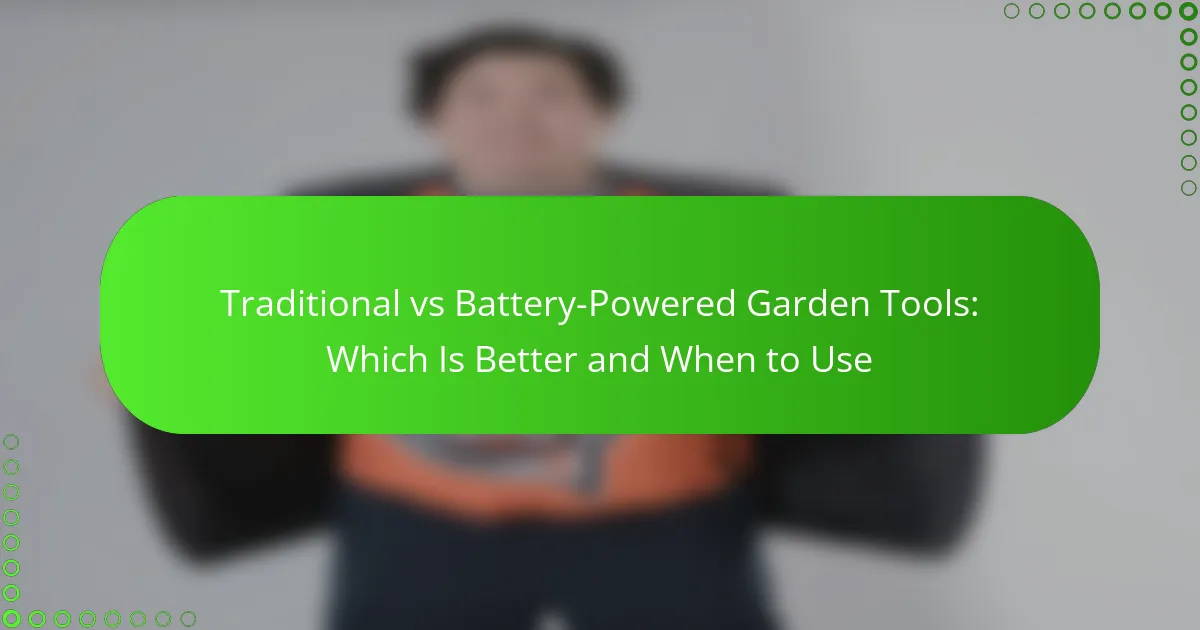When it comes to gardening, choosing between electric and manual tools can greatly impact your efficiency and enjoyment. Electric tools offer speed and ease, perfect for larger tasks, while manual tools provide precision and control for smaller jobs. Understanding the strengths and limitations of each type can help you select the right tools for your gardening needs and budget.

What are the benefits of electric gardening tools in South Africa?
Electric gardening tools offer several advantages in South Africa, including increased efficiency, reduced physical strain, and consistent power output. These tools can significantly enhance productivity, making gardening tasks easier and quicker.
Efficiency and speed
Electric gardening tools are designed for high efficiency, allowing users to complete tasks much faster than with manual tools. For instance, electric lawn mowers can cut grass in a fraction of the time it takes to use a push mower, making them ideal for larger gardens.
Additionally, the speed of electric tools means less time spent on maintenance and more time enjoying your garden. This is particularly beneficial in South Africa, where gardening seasons can be short due to varying climates.
Reduced physical strain
Using electric gardening tools can significantly lessen physical strain, especially for those with limited strength or mobility. Tools like electric trimmers and blowers require minimal effort compared to their manual counterparts, reducing the risk of injury.
This is especially important for older gardeners or those with back problems, as electric tools often come with ergonomic designs that further enhance comfort during use.
Consistent power output
Electric gardening tools provide a steady power output, ensuring consistent performance throughout the task. Unlike manual tools, which can tire the user, electric tools maintain their effectiveness without requiring additional effort.
This consistent power is particularly useful for tasks such as trimming hedges or mowing lawns, where uniform results are desired. Users can expect a clean, even cut every time, regardless of the size of the job.
Advanced features
Many electric gardening tools come equipped with advanced features that enhance usability and efficiency. Features like adjustable speed settings, battery indicators, and lightweight designs can make gardening tasks more manageable.
For example, some electric hedge trimmers offer laser-cut blades for cleaner cuts, while battery-powered tools eliminate the hassle of cords, providing greater freedom of movement. These innovations can significantly improve the gardening experience in South Africa’s diverse landscapes.
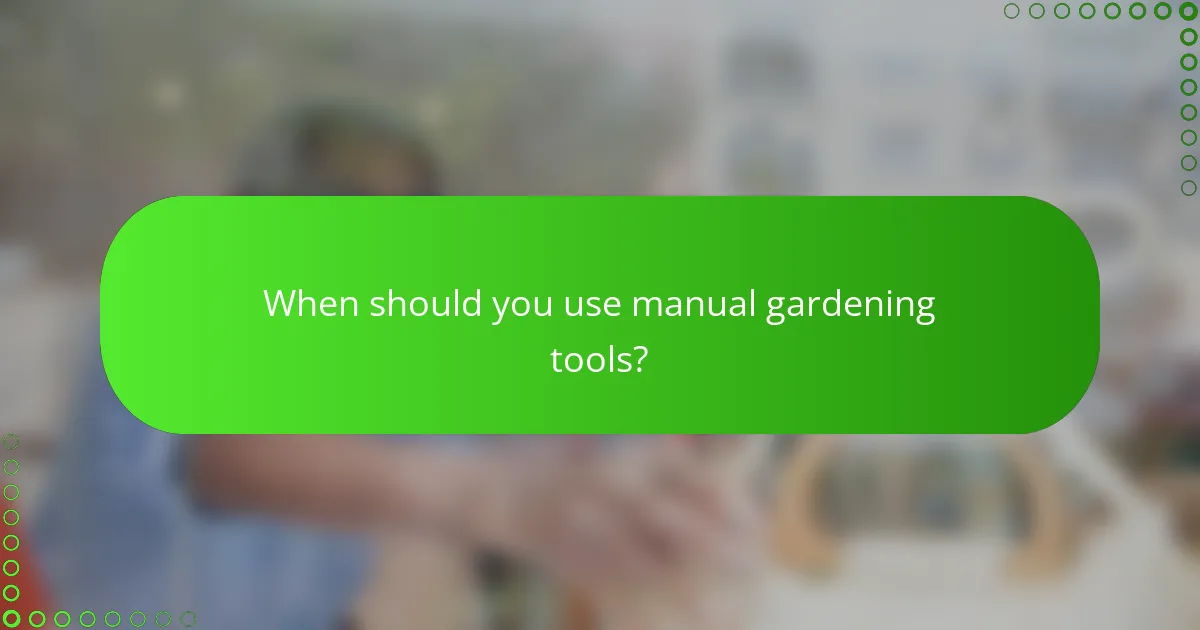
When should you use manual gardening tools?
Manual gardening tools are best used for tasks that require precision, cost-effectiveness, and minimal maintenance. They are ideal for small gardens or specific jobs where control and finesse are necessary.
Precision tasks
Manual tools excel in precision tasks such as planting seeds, weeding, and pruning. For example, using a hand trowel allows you to dig small holes without disturbing surrounding plants. When working in tight spaces or delicate areas, manual tools provide the control needed to avoid damaging nearby flora.
For intricate tasks like bonsai trimming or flower bed shaping, manual tools are often preferred. They allow for careful manipulation and detailed work that electric tools may not achieve effectively.
Lower cost
Manual gardening tools generally have a lower upfront cost compared to electric options. Basic tools like hand pruners, hoes, and rakes can often be found for under $50, making them accessible for most gardeners. Additionally, they do not require electricity or batteries, leading to ongoing savings.
Investing in quality manual tools can yield long-term benefits, as they often last many years with proper care. This makes them a cost-effective choice for hobbyists and professional gardeners alike.
Maintenance and repairs
Manual gardening tools require less maintenance than electric ones, as they typically have fewer moving parts. Regular cleaning and occasional sharpening are usually sufficient to keep them in good working condition. This simplicity means you can spend more time gardening and less time on upkeep.
In case of damage, repairs for manual tools are often straightforward and inexpensive. For instance, a broken handle can usually be replaced without needing specialized skills or tools, unlike electric tools which may require professional servicing.
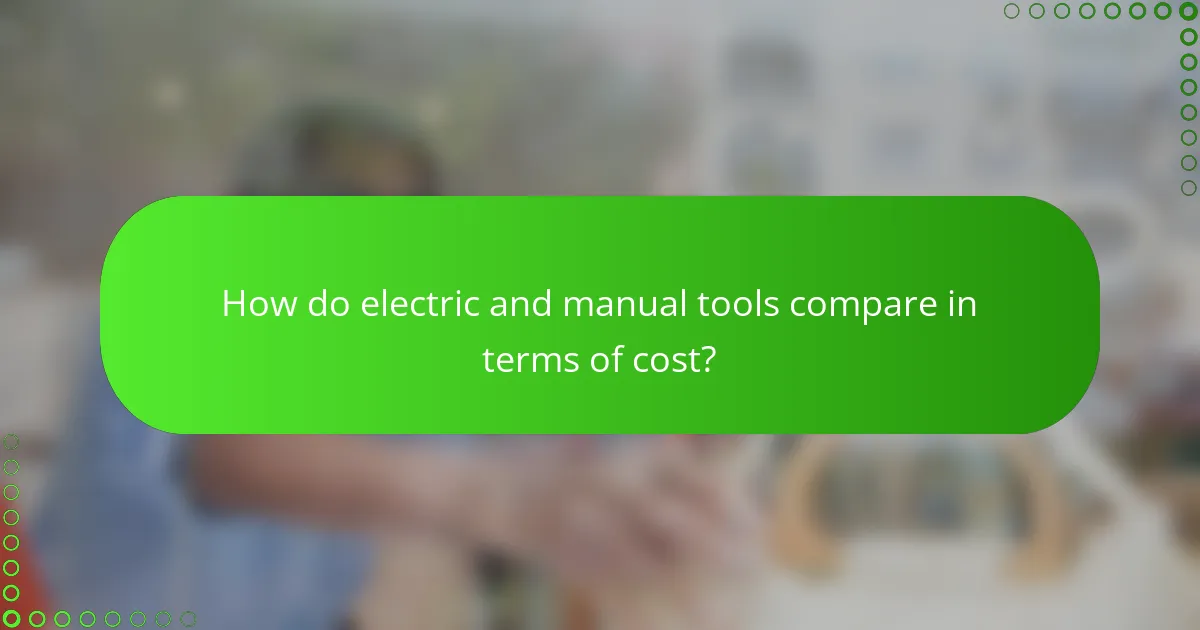
How do electric and manual tools compare in terms of cost?
Electric and manual gardening tools vary significantly in cost, influenced by factors like initial purchase price, long-term savings, and maintenance expenses. Understanding these differences helps gardeners make informed decisions based on their budget and gardening needs.
Initial investment
The initial investment for electric gardening tools is typically higher than for manual tools. For example, electric lawn mowers can range from a few hundred to over a thousand USD, while manual push mowers may cost under a hundred USD. This upfront cost is an important consideration for budget-conscious gardeners.
However, the price of electric tools can vary widely based on features and brand. Investing in a quality electric tool may lead to better performance and durability, potentially offsetting the higher initial cost over time.
Long-term savings
Long-term savings can be significant when using electric tools, as they often require less physical effort and can reduce labor time. For instance, electric trimmers and blowers can complete tasks faster than their manual counterparts, allowing gardeners to save time and energy.
Additionally, electric tools may lead to lower energy costs, especially if they are battery-operated. Over several years, these savings can accumulate, making electric tools a cost-effective choice for regular gardeners.
Maintenance costs
Maintenance costs for electric tools can be higher due to the need for battery replacements and potential repairs to electrical components. Regular maintenance, such as cleaning and sharpening blades, is still necessary for both types of tools, but electric tools may require specialized care.
In contrast, manual tools generally have lower maintenance costs, as they are simpler and often made from durable materials. Gardeners should consider these ongoing costs when evaluating which type of tool best fits their gardening style and budget.

What factors should you consider when choosing gardening tools?
When choosing gardening tools, consider factors such as garden size, the type of plants you are growing, and your personal physical capability. These elements will help you determine whether electric or manual tools are more suitable for your gardening needs.
Garden size
The size of your garden significantly influences your choice of gardening tools. For small gardens, manual tools may suffice, allowing for greater control and precision. In contrast, larger gardens often benefit from electric tools, which can save time and reduce physical strain.
As a rule of thumb, if your garden exceeds a few hundred square meters, consider investing in electric tools for tasks like mowing or tilling. Manual tools can be effective for smaller plots, where maneuverability is key.
Type of plants
The types of plants you cultivate also play a crucial role in selecting the right tools. Delicate plants, such as flowers or herbs, may require manual tools for careful handling, while robust plants like shrubs or trees can be managed more efficiently with electric tools.
For instance, if you are growing a variety of vegetables, a combination of both tool types might be ideal. Use manual tools for planting and harvesting, while electric tools can assist with larger tasks like soil preparation.
Personal physical capability
Your physical capability should guide your choice between electric and manual gardening tools. If you have limited strength or mobility, electric tools can alleviate the physical demands of gardening, making tasks easier and more enjoyable.
For those who are physically fit and prefer a hands-on approach, manual tools can provide a satisfying workout. However, be cautious of overexertion; it’s essential to choose tools that match your strength and stamina to prevent injury.

How do electric gardening tools perform in South African climates?
Electric gardening tools can be effective in South African climates, but their performance varies based on factors like heat and humidity. Understanding how these tools operate in local conditions is crucial for optimal use.
Battery life in heat
In South Africa’s warm climate, battery life for electric gardening tools can be significantly affected. High temperatures may lead to quicker battery depletion, often reducing operational time by 20-30% compared to cooler conditions.
To maximize battery life, consider using tools during cooler parts of the day, such as early morning or late afternoon. Keeping batteries stored in shaded areas can also help maintain their efficiency.
Durability against weather
Electric gardening tools need to withstand South Africa’s diverse weather conditions, including sun, rain, and dust. Many models are designed with weather-resistant features, but not all are equally durable.
Look for tools with IP ratings that indicate water and dust resistance. Regular maintenance, such as cleaning and proper storage, can extend the life of your electric tools, ensuring they perform well despite challenging weather.

What are the top brands of electric gardening tools available in South Africa?
In South Africa, several reputable brands offer high-quality electric gardening tools, catering to various gardening needs. Popular brands include Bosch, Makita, and Ryobi, known for their durability and performance.
Bosch electric gardening tools
Bosch is a leading brand in the electric gardening tool market, offering a wide range of products such as lawnmowers, hedge trimmers, and leaf blowers. Their tools are designed for efficiency and ease of use, making them suitable for both amateur and professional gardeners.
When choosing Bosch tools, consider their ergonomic designs and powerful motors, which can handle various gardening tasks effectively. Many models also feature safety mechanisms to protect users during operation.
Makita electric gardening tools
Makita is another prominent brand, recognized for its robust electric gardening tools, including chainsaws, trimmers, and blowers. Their products are often praised for their reliability and long battery life, making them ideal for extended gardening sessions.
Makita tools typically come with advanced features such as variable speed settings and lightweight designs, enhancing user comfort and control. Investing in Makita tools can be beneficial for those who prioritize performance and durability.
Ryobi electric gardening tools
Ryobi offers a diverse selection of electric gardening tools that are budget-friendly yet effective. Their range includes electric mowers, string trimmers, and garden vacuums, catering to various gardening tasks.
Ryobi tools are known for their user-friendly designs and good value for money. Many models are compatible with interchangeable batteries, allowing users to switch between tools without needing multiple chargers.






